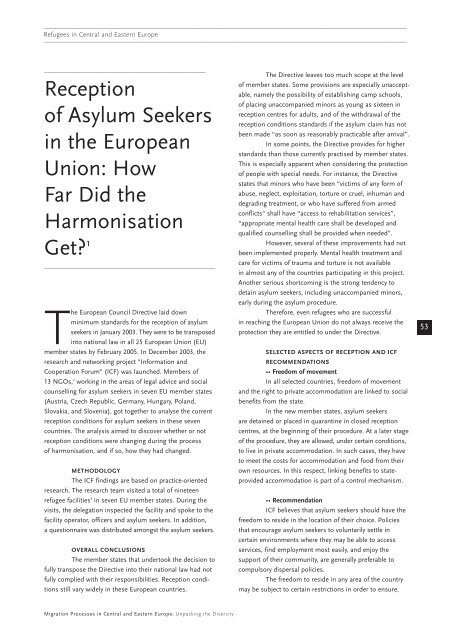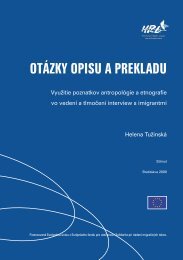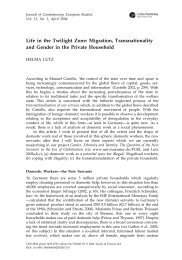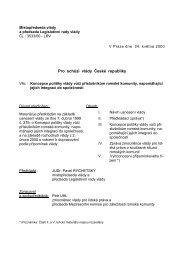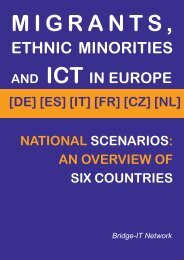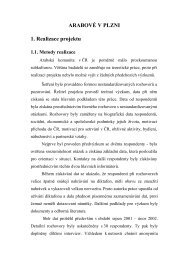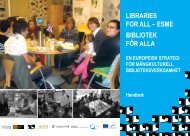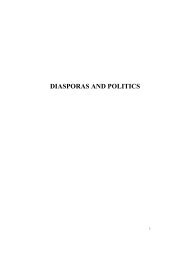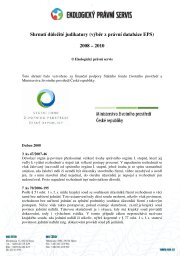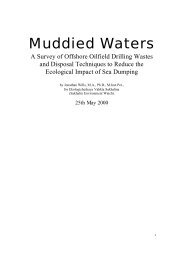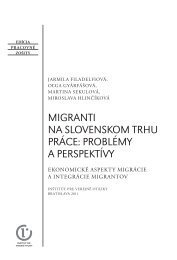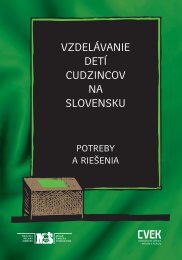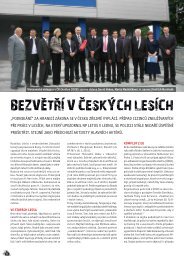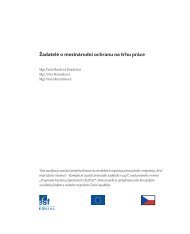Migration Processes in Central and Eastern Europe - Multiple Choices
Migration Processes in Central and Eastern Europe - Multiple Choices
Migration Processes in Central and Eastern Europe - Multiple Choices
Create successful ePaper yourself
Turn your PDF publications into a flip-book with our unique Google optimized e-Paper software.
———————————————————————————————————————————————————————————————<br />
Refugees <strong>in</strong> <strong>Central</strong> <strong>and</strong> <strong>Eastern</strong> <strong>Europe</strong><br />
———————————————————————————————————————————————————————————————<br />
————————————————————————————<br />
Reception<br />
of Asylum Seekers<br />
<strong>in</strong> the <strong>Europe</strong>an<br />
Union: How<br />
Far Did the<br />
Harmonisation<br />
Get? 1<br />
—————————————————————————————<br />
The <strong>Europe</strong>an Council Directive laid down<br />
m<strong>in</strong>imum st<strong>and</strong>ards for the reception of asylum<br />
seekers <strong>in</strong> January 2003. They were to be transposed<br />
<strong>in</strong>to national law <strong>in</strong> all 25 <strong>Europe</strong>an Union (EU)<br />
member states by February 2005. In December 2003, the<br />
research <strong>and</strong> network<strong>in</strong>g project "Information <strong>and</strong><br />
Cooperation Forum" (ICF) was launched. Members of<br />
13 NGOs, 2 work<strong>in</strong>g <strong>in</strong> the areas of legal advice <strong>and</strong> social<br />
counsell<strong>in</strong>g for asylum seekers <strong>in</strong> seven EU member states<br />
(Austria, Czech Republic, Germany, Hungary, Pol<strong>and</strong>,<br />
Slovakia, <strong>and</strong> Slovenia), got together to analyse the current<br />
reception conditions for asylum seekers <strong>in</strong> these seven<br />
countries. The analysis aimed to discover whether or not<br />
reception conditions were chang<strong>in</strong>g dur<strong>in</strong>g the process<br />
of harmonisation, <strong>and</strong> if so, how they had changed.<br />
METHODOLOGY<br />
The ICF f<strong>in</strong>d<strong>in</strong>gs are based on practice-oriented<br />
research. The research team visited a total of n<strong>in</strong>eteen<br />
refugee facilities 3 <strong>in</strong> seven EU member states. Dur<strong>in</strong>g the<br />
visits, the delegation <strong>in</strong>spected the facility <strong>and</strong> spoke to the<br />
facility operator, officers <strong>and</strong> asylum seekers. In addition,<br />
a questionnaire was distributed amongst the asylum seekers.<br />
OVERALL CONCLUSIONS<br />
The member states that undertook the decision to<br />
fully transpose the Directive <strong>in</strong>to their national law had not<br />
fully complied with their responsibilities. Reception conditions<br />
still vary widely <strong>in</strong> these <strong>Europe</strong>an countries.<br />
The Directive leaves too much scope at the level<br />
of member states. Some provisions are especially unacceptable,<br />
namely the possibility of establish<strong>in</strong>g camp schools,<br />
of plac<strong>in</strong>g unaccompanied m<strong>in</strong>ors as young as sixteen <strong>in</strong><br />
reception centres for adults, <strong>and</strong> of the withdrawal of the<br />
reception conditions st<strong>and</strong>ards if the asylum claim has not<br />
been made “as soon as reasonably practicable after arrival”.<br />
In some po<strong>in</strong>ts, the Directive provides for higher<br />
st<strong>and</strong>ards than those currently practised by member states.<br />
This is especially apparent when consider<strong>in</strong>g the protection<br />
of people with special needs. For <strong>in</strong>stance, the Directive<br />
states that m<strong>in</strong>ors who have been “victims of any form of<br />
abuse, neglect, exploitation, torture or cruel, <strong>in</strong>human <strong>and</strong><br />
degrad<strong>in</strong>g treatment, or who have suffered from armed<br />
conflicts" shall have “access to rehabilitation services”,<br />
“appropriate mental health care shall be developed <strong>and</strong><br />
qualified counsell<strong>in</strong>g shall be provided when needed”.<br />
However, several of these improvements had not<br />
been implemented properly. Mental health treatment <strong>and</strong><br />
care for victims of trauma <strong>and</strong> torture is not available<br />
<strong>in</strong> almost any of the countries participat<strong>in</strong>g <strong>in</strong> this project.<br />
Another serious shortcom<strong>in</strong>g is the strong tendency to<br />
deta<strong>in</strong> asylum seekers, <strong>in</strong>clud<strong>in</strong>g unaccompanied m<strong>in</strong>ors,<br />
early dur<strong>in</strong>g the asylum procedure.<br />
Therefore, even refugees who are successful<br />
<strong>in</strong> reach<strong>in</strong>g the <strong>Europe</strong>an Union do not always receive the<br />
protection they are entitled to under the Directive.<br />
SELECTED ASPECTS OF RECEPTION AND ICF<br />
RECOMMENDATIONS<br />
•• Freedom of movement<br />
In all selected countries, freedom of movement<br />
<strong>and</strong> the right to private accommodation are l<strong>in</strong>ked to social<br />
benefits from the state.<br />
In the new member states, asylum seekers<br />
are deta<strong>in</strong>ed or placed <strong>in</strong> quarant<strong>in</strong>e <strong>in</strong> closed reception<br />
centres, at the beg<strong>in</strong>n<strong>in</strong>g of their procedure. At a later stage<br />
of the procedure, they are allowed, under certa<strong>in</strong> conditions,<br />
to live <strong>in</strong> private accommodation. In such cases, they have<br />
to meet the costs for accommodation <strong>and</strong> food from their<br />
own resources. In this respect, l<strong>in</strong>k<strong>in</strong>g benefits to stateprovided<br />
accommodation is part of a control mechanism.<br />
•• Recommendation<br />
ICF believes that asylum seekers should have the<br />
freedom to reside <strong>in</strong> the location of their choice. Policies<br />
that encourage asylum seekers to voluntarily settle <strong>in</strong><br />
certa<strong>in</strong> environments where they may be able to access<br />
services, f<strong>in</strong>d employment most easily, <strong>and</strong> enjoy the<br />
support of their community, are generally preferable to<br />
compulsory dispersal policies.<br />
The freedom to reside <strong>in</strong> any area of the country<br />
may be subject to certa<strong>in</strong> restrictions <strong>in</strong> order to ensure,<br />
53<br />
<strong>Migration</strong> <strong>Processes</strong> <strong>in</strong> <strong>Central</strong> <strong>and</strong> <strong>Eastern</strong> <strong>Europe</strong>: Unpack<strong>in</strong>g the Diversity


